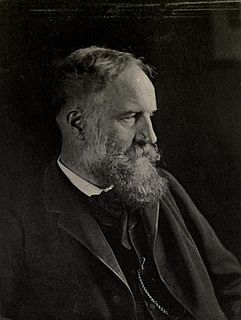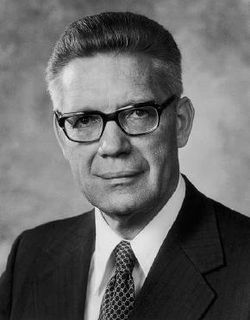A Quote by Harriet Beecher Stowe
No one is so thoroughly superstitious as the godless man. Life and death to him are haunted grounds, filled with goblin forms of vague and shadowy dread.
Quote Topics
Related Quotes
Everybody is afraid of death for the simple reason that we have not tasted of life yet. The man who knows what life is, is never afraid of death; he welcomes death. Whenever death comes he hugs death, he embraces death, he welcomes death, he receives death as a guest. To the man who has not known what life is, death is an enemy; and to the man who knows what life is, death is the ultimate crescendo of life.
Animals learn death first at the moment of death;...man approaches death with the knowledge it is closer every hour, and this creates a feeling of uncertainty over his life, even for him who forgets in the business of life that annihilation is awaiting him. It is for this reason chiefly that we have philosophy and religion.
We are born haunted, he said, his voice weak, but still clear. Haunted by our fathers and mothers and daughters, and by people we don't remember. We are haunted by otherness, by the path not taken, by the life unlived. We are haunted by the changing winds and the ebbing tides of history. And even as our own flame burns brightest, we are haunted by the embers of the first dying fire. But mostly, said Lord Jim, we are haunted by ourselves.
She cried, "Laura," up the garden, "Did you miss me? Come and kiss me. Never mind my bruises, Hug me, kiss me, suck my juices Squeezed from goblin fruits for you, Goblin pulp and goblin dew. Eat me, drink me, love me; Laura, make much of me; For your sake I have braved the glen And had to do with goblin merchant men.
Among the English authors, Shakespeare has incomparably excelled all others. That noble extravagance of fancy, which he had in so great perfection, thoroughly qualified him to touch the weak, superstitious part of his readers' imagination, and made him capable of succeeding where he had nothing to support him besides the strength of his own genius.
He felt his heart pounding fiercely in his chest. How strange that in his dread of death, it pumped all the harder, valiantly keeping him alive. But it would have to stop, and soon. Its beats were numbered. How many would there be time for, as he rose and walked through the castle for the last time, out into the grounds and into the forest?
We are left with nothing but death, the irreducible fact of our own mortality. Death after a long illness we can accept with resignation. Even accidental death we can ascribe to fate. But for a man to die of no apparent cause, for a man to die simply because he is a man, brings us so close to the invisible boundary between life and death that we no longer know which side we are on. Life becomes death, and it is as if this death has owned this life all along. Death without warning. Which is to say: life stops. And it can stop at any moment.
The greatest dread of ordinary man is death, with its rude imposition interrupting fortuitous plans and fondest attachments with an unknown and unwelcome change. The yogi is a conqueror of the grief associated with death. By control of mind and life force and the development of wisdom, he makes friends with the change of consciousness called death-he becomes familiar with the state of inner calmness and aloofness from identification with the mortal body.

































